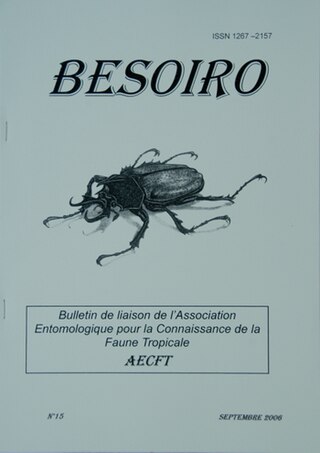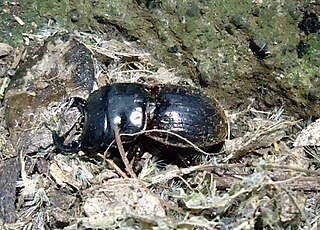
Stag beetles are a family of about 1,200 species of beetles in the family Lucanidae, currently classified in four subfamilies. Some species grow to over 12 centimetres, but most to about 5 cm (2 in).

Dorcus is a genus of beetles in the stag beetle family Lucanidae. Of the over 100 species, most occur in Asia and India; two are found in southern Europe, and two species are from North America. Previously, specimens with serriform teeth on the mandibles and sable pigment were called Serrognathus whereas specimens with but a singular or multiple bulky notches on the mandibles and lustrous sable pigmentation were called Dorcus.

The Lucaninae comprise the largest subfamily of the stag beetles (Lucanidae).

Phalacrognathus muelleri, colloquially known as the rainbow stag beetle, and also the king, magnificent or Mueller's stag beetle, is a species of beetle in the family Lucanidae. It is found in northern Queensland, Australia and New Guinea. It can come in red, green, black, and blue forms. It is the only species in its genus, Phalacrognathus, which is closely related to the genus Lamprima.

The white-bellied pitohui is a species of bird in the family Pachycephalidae. It is found throughout the lowlands of southern New Guinea (Lorentz River to upper Fly River.
Jean-Pierre Lacroix (1938–1989) was a French entomologist.

Besoiro is a French entomological scientific journal. It is published by Patrick Arnaud and was established in 1995. The name means beetle in Portuguese. The taxa described are included in the Zoological Record.

Cyclommatus is a genus of the family Lucanidae, also known as the stag beetle. The majority of the species from the genus Cyclommatus are located in Southeast Asia, though some species are found in China and Taiwan as well. The genus Cyclommatus also consists of three subgenera: Cyclommatus, Cyclommatinus and Cyclommatellus. Each subgenera contains 80, 24 and 3 species respectively. In total, the genus Cyclommatus consists of a total of 134 species, though more are still being discovered to this day.

Odontolabis is a genus of beetles belonging to the family Lucanidae.
Figulus planifrons is a species in the stag beetle family Lucanidae. It is found on the Indonesian island of Sumatra.

Geodorcus capito is a large flightless species of stag beetle in the family Lucanidae. It is endemic to the Chatham Islands in New Zealand.

Aegus is a genus of stag beetles in the family Lucanidae. Comprising about 260 species in the genus, they are placed in the largest subfamily Lucaninae. They are distributed in South Asia, Southeast Asia and the Pacific countries, but introduced accidentally to many parts of the islands.

Figulus is a genus of beetle in the family Lucanidae. They have a paleotropical distribution, including occurrences in Australia.

Figulus hornabrooki is a species of Stag Beetle in the beetle family Lucanidae. It is found in Indonesia and Papua New Guinea.

Figulus binodulus is a species in the stag beetle family Lucanidae. It is found in temperate Asia.

Figulus lilliputanus is a species in the stag beetle family Lucanidae. It is found in Australia.

Figulus foveicollis is a species in the stag beetle family Lucanidae. It is found in New Caledonia, New Guinea, and Tahiti.

Figulus punctatus is a species in the stag beetle family Lucanidae. It is found in temperate Asia.














